This Post May Contain Affiliate Links. Please Read Our Disclosure Policy.
This au jus recipe is so rich and flavorful and can be made with or without drippings! Perfect alongside my easy prime rib recipe, for French dip sandwiches, or over beef and noodles. So much flavor, quick, and easy.
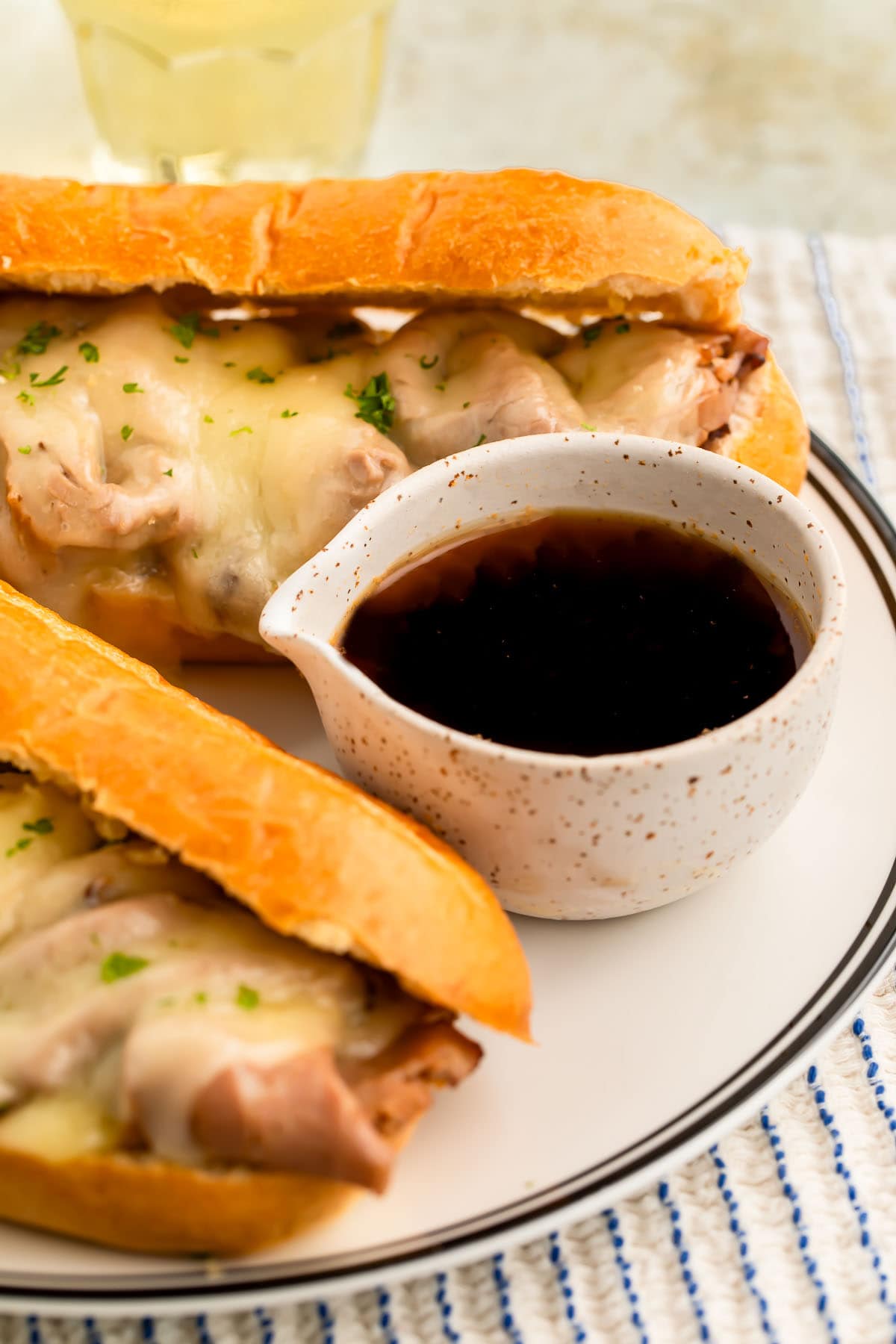
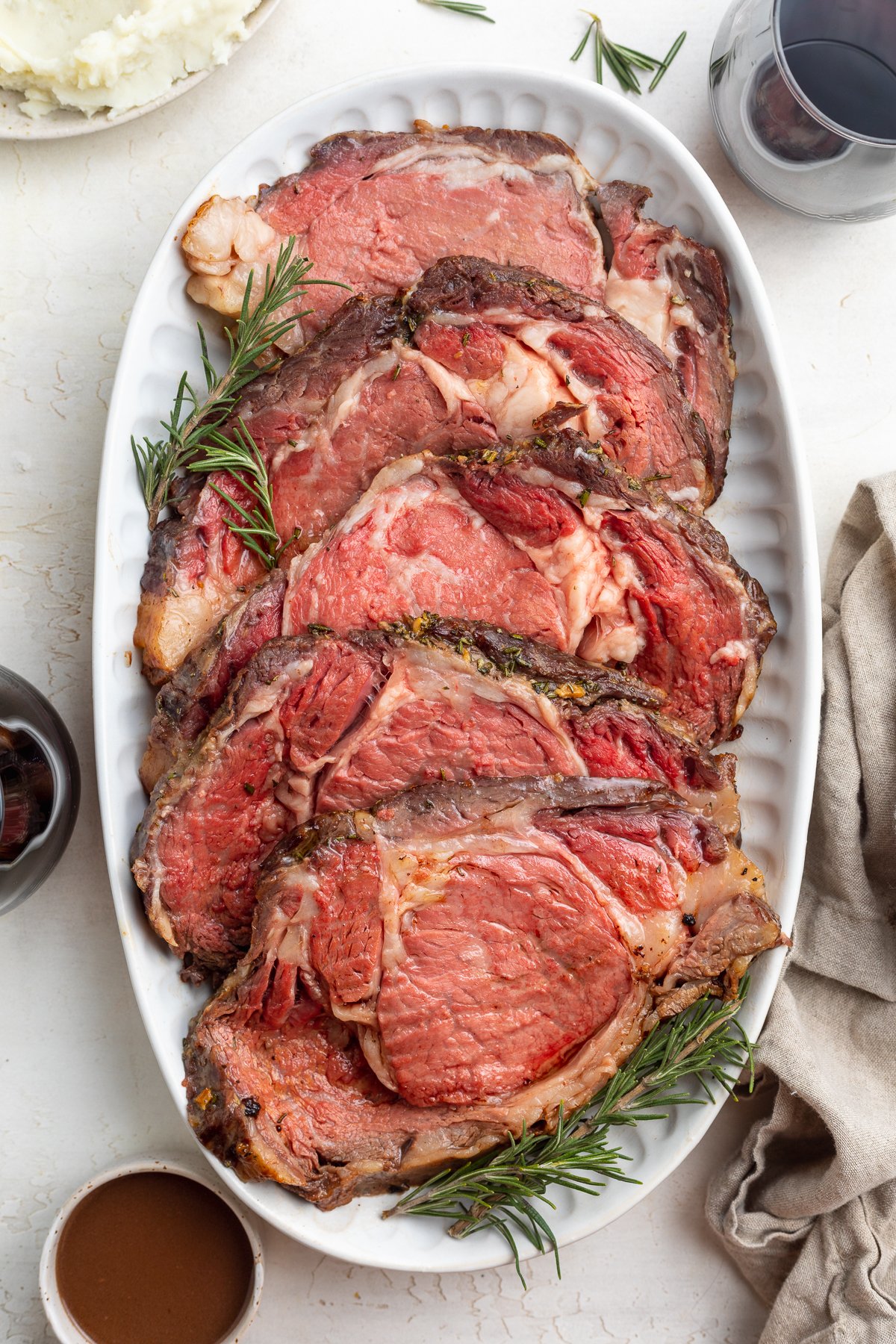
We recommend pairing this simple jus with our perfect (and easy) prime rib recipe!
What Makes This Recipe So Good
- Au jus recipes may seem intimidating, but I promise this one’s super easy. You’ll have no trouble at all making a delicious, savory dipping sauce that’ll impress even the pickiest eaters.
- We use the fewest ingredients we can to get the most flavor possible! Some recipes might call for just drippings + broth, which works for a very basic jus. This recipe also uses a little red wine and Worcestershire to really put it over the top!
- You can make it with or without beef drippings! Sure, a classic au jus starts from meat drippings, but you may not always have those handy, so it’s nice to have an alternative.
What is Au Jus and How Do I Use It?
Au jus (pronounced like “zhoo”) is a French culinary term meaning “with juice.” Not to be pedantic, but what we’re making here is the jus. Once it’s made, you’ll serve your entrée au jus – “with juice”.
Au jus is essentially like a thin gravy made from the meat’s own juices, and it’s a delicious and easy way to enhance the flavor of meaty dishes. Use it similarly to how you might use a gravy, with a meat dish like prime rib roast or roast chicken, over beef and noodles, or as a dip for beef sliders.
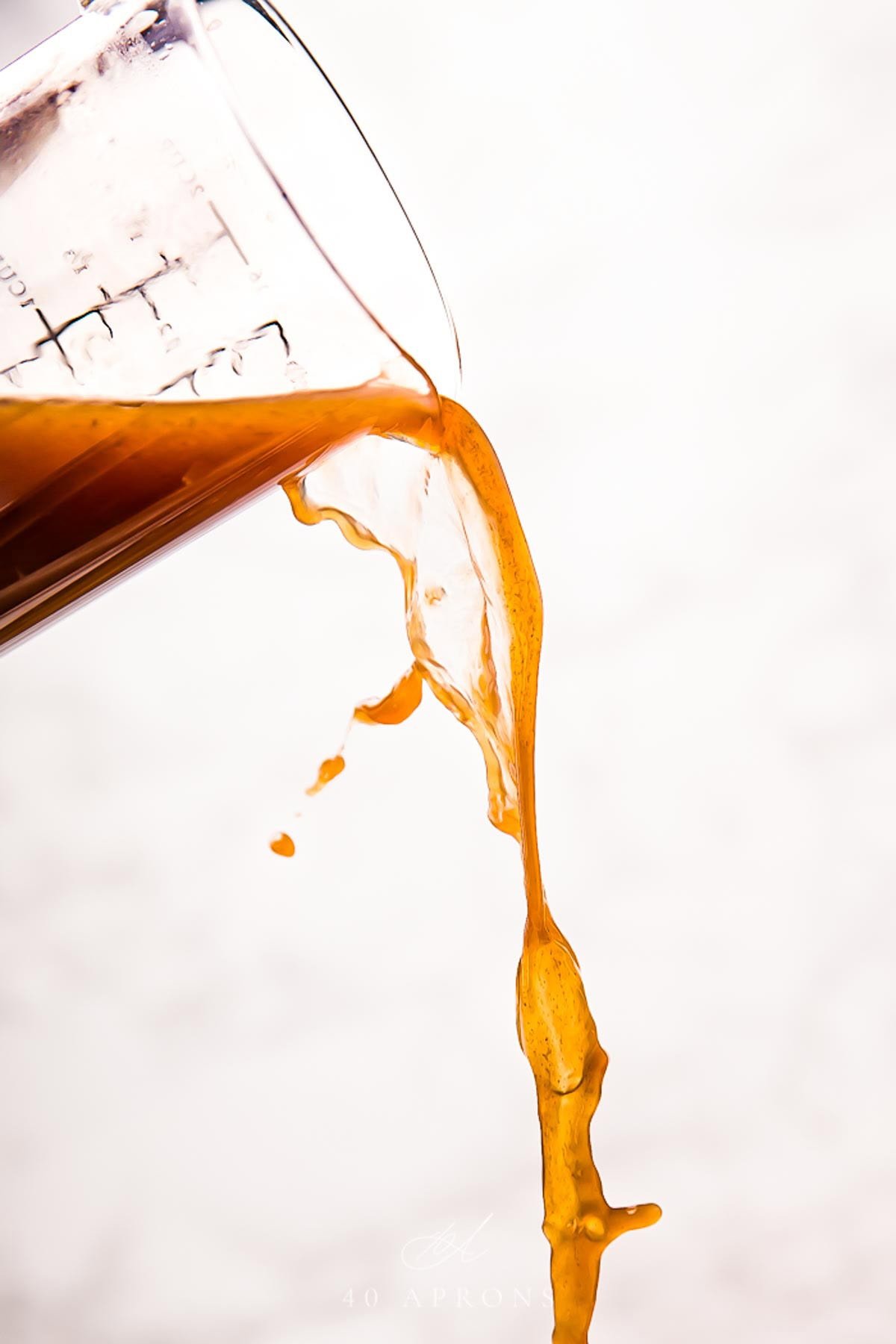
Cheryl’s Tips
- You don’t need an expensive red wine for the perfect au jus. In fact, a red in the $5-$10 range is more than perfect for cooking. It should be something you enjoy the taste of, of course, but this isn’t the time to break out anything fancy. I recommend something with a bit of body, like a cabernet sauvignon, a pinot noir, or a merlot. Malbec or shiraz would also work, but be careful not to choose something with too much body.
- The beef drippings obviously come from cooking beef. If you end up with beef remnants in the drippings, don’t worry! Pour the jus through a fine mesh sieve and into your serving container, that way you get all the flavor in a sauce that’s nice and smooth.
- This au jus recipe is perfect for a make-ahead option. To store your jus, keep it in the fridge in an airtight container for 3-4 days. You can also freeze it in an ice cube tray, then transfer it to a sealable plastic bag or other airtight container and keep it in the freezer up to 6 months.
- If you are on a strict gluten-free diet, make sure your Worcestershire sauce is gluten free. Some brands of Worcestershire use malt vinegar, which is made from a grain barley that contains gluten.
Making changes to a recipe can result in recipe failure. Any substitutions or variations listed are simple changes that I believe will work in this recipe, but results are not guaranteed.
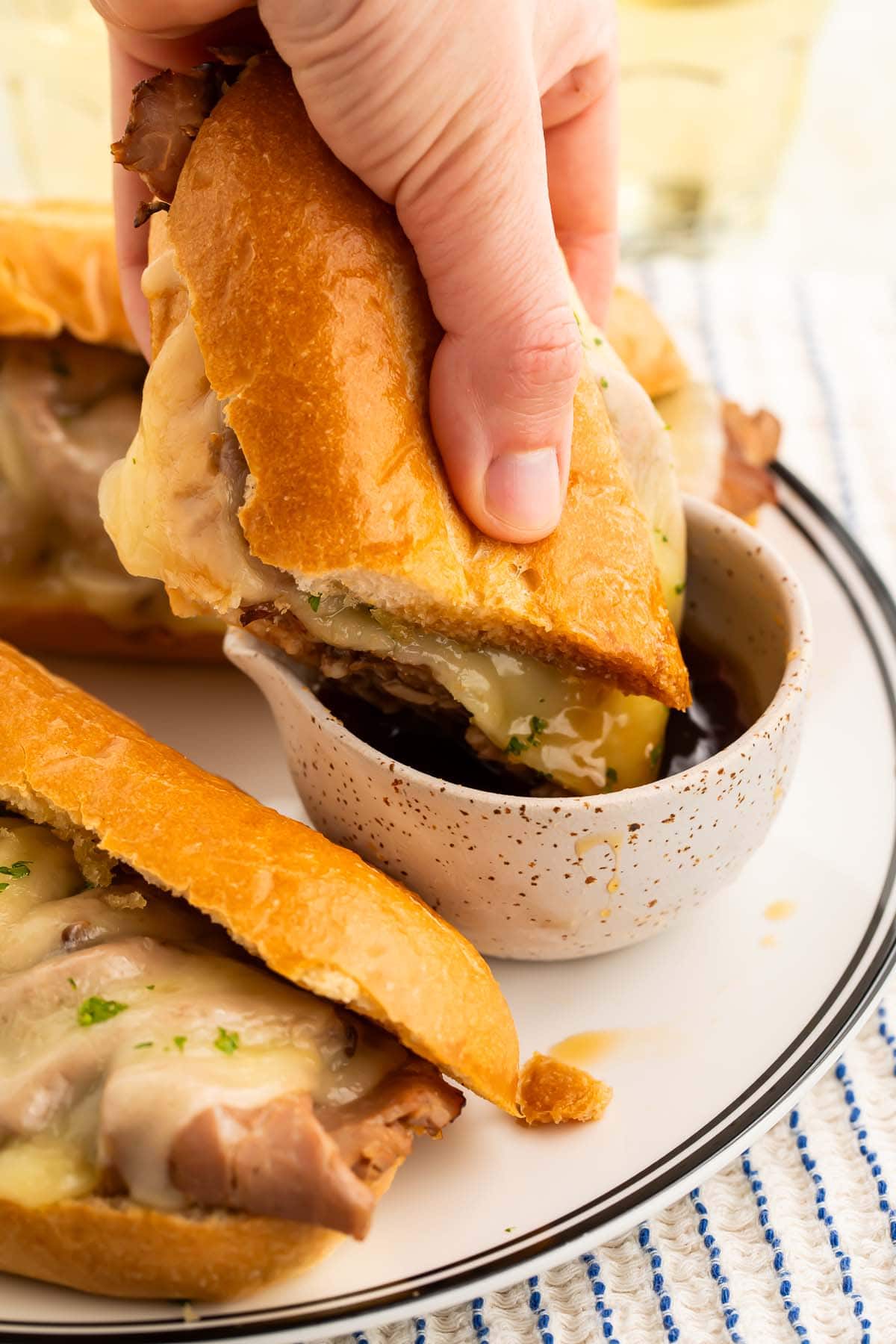
Other Incredible Recipes You’ll Love
- Instant Pot Turkey Breast
- Easy Prime Rib with Au Jus Recipe and Perfect Creamy Horseradish Sauce
- Creamy Horseradish Sauce for Prime Rib
- Creamy Garlic Chicken
- The Best Crockpot Angel Chicken
- Garlic and Herb Sous Vide Turkey
- Salmon Wellington
- Cocktail Blini (For Caviar and More!)
- Beef Consommé
- Garlic Butter Parsley Potatoes
- Easy Sous Vide Chicken Breast Recipe
- The Best Filet Mignon Recipe Ever with Garlic-Herb Compound Butter (Reverse Sear)
- Slow Cooker Garlic Butter Whole Chicken with Gravy
- Best Mushroom Swiss Burger Recipe
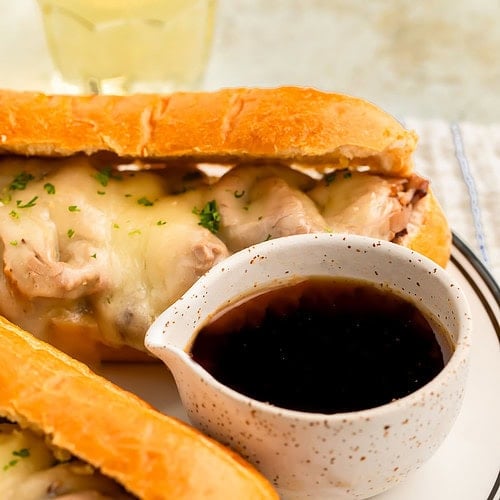
Au Jus Recipe (Made With or Without Drippings)
Equipment
- medium saucepan
- whisk
- serving container
Ingredients
For Jus From Drippings
- 4 tablespoons beef drippings
- 4 tablespoons red wine or low-sodium beef broth
- 2 cups low-sodium beef broth
- 1 tablespoon Worcestershire sauce
- salt to taste
- freshly cracked black pepper to taste
For Jus Without Drippings
- 4 tablespoons unsalted butter
- 4 tablespoons red wine or low-sodium beef broth
- 2 cups low-sodium beef broth
- 1 tablespoon Worcestershire sauce
- ½ teaspoon onion powder
- ½ teaspoon garlic powder
- ½ teaspoon salt more or less to taste
Instructions
For Jus from Drippings
- Place medium saucepan on stovetop over high heat. When saucepan is warm, add 4 tablespoons beef drippings, 4 tablespoons red wine, 2 cups low-sodium beef broth, and 1 tablespoon Worcestershire sauce.
- Whisk ingredients together until incorporated, then bring mixture to boil. Once mixture begins to boil, reduce heat under saucepan to medium-low. Simmer mixture 5 minutes.
- After 5 minutes, taste mixture and add salt and freshly cracked black pepper to taste. When satisfied with flavor, transfer jus into serving container. Note: if your drippings contained any remnants from the beef, strain the jus through a fine mesh sieve first, so you're left with a smooth liquid.
- Serve warm with prime rib, French dip sandwiches, roast beef, or other meal as desired.
For Jus without Drippings
- Place medium saucepan on stovetop over high heat. When saucepan is warm, add 4 tablespoons unsalted butter, 4 tablespoons red wine, 2 cups low-sodium beef broth, 1 tablespoon Worcestershire sauce, ½ teaspoon onion powder, and ½ teaspoon garlic powder.
- Whisk ingredients together until incorporated, then bring mixture to boil. Once mixture begins to boil, reduce heat under saucepan to medium-low. Simmer mixture 5 minutes.
- After 5 minutes, taste mixture and add ½ teaspoon salt, onion powder, and/or garlic as desired. When satisfied with flavor, transfer au jus into serving container.
- Serve warm with prime rib, French dip sandwiches, roast beef, or other meal as desired.
- Red Wine: Use a medium-bodied red wine, like a cabernet sauvignon, a merlot, or a pinot noir. Malbec or shiraz would also work but be careful not to choose one with too much body.
- Make it Gluten Free: Use a gluten-free Worcestershire and make sure your broth is gluten free.
Approximate Information for One Serving
Nutrition Disclaimers
Number of total servings shown is approximate. Actual number of servings will depend on your preferred portion sizes.
Nutritional values shown are general guidelines and reflect information for 1 serving using the ingredients listed, not including any optional ingredients. Actual macros may vary slightly depending on specific brands and types of ingredients used.
To determine the weight of one serving, prepare the recipe as instructed. Weigh the finished recipe, then divide the weight of the finished recipe (not including the weight of the container the food is in) by the desired number of servings. Result will be the weight of one serving.
Did You Make This Recipe?
Tag @40aprons on Instagram and be sure to leave a review on the blog post!
Never Miss A Meal!
New Recipes Straight To Your Inbox
A curated selection of our most recent recipes, delivered straight to your inbox once a week.
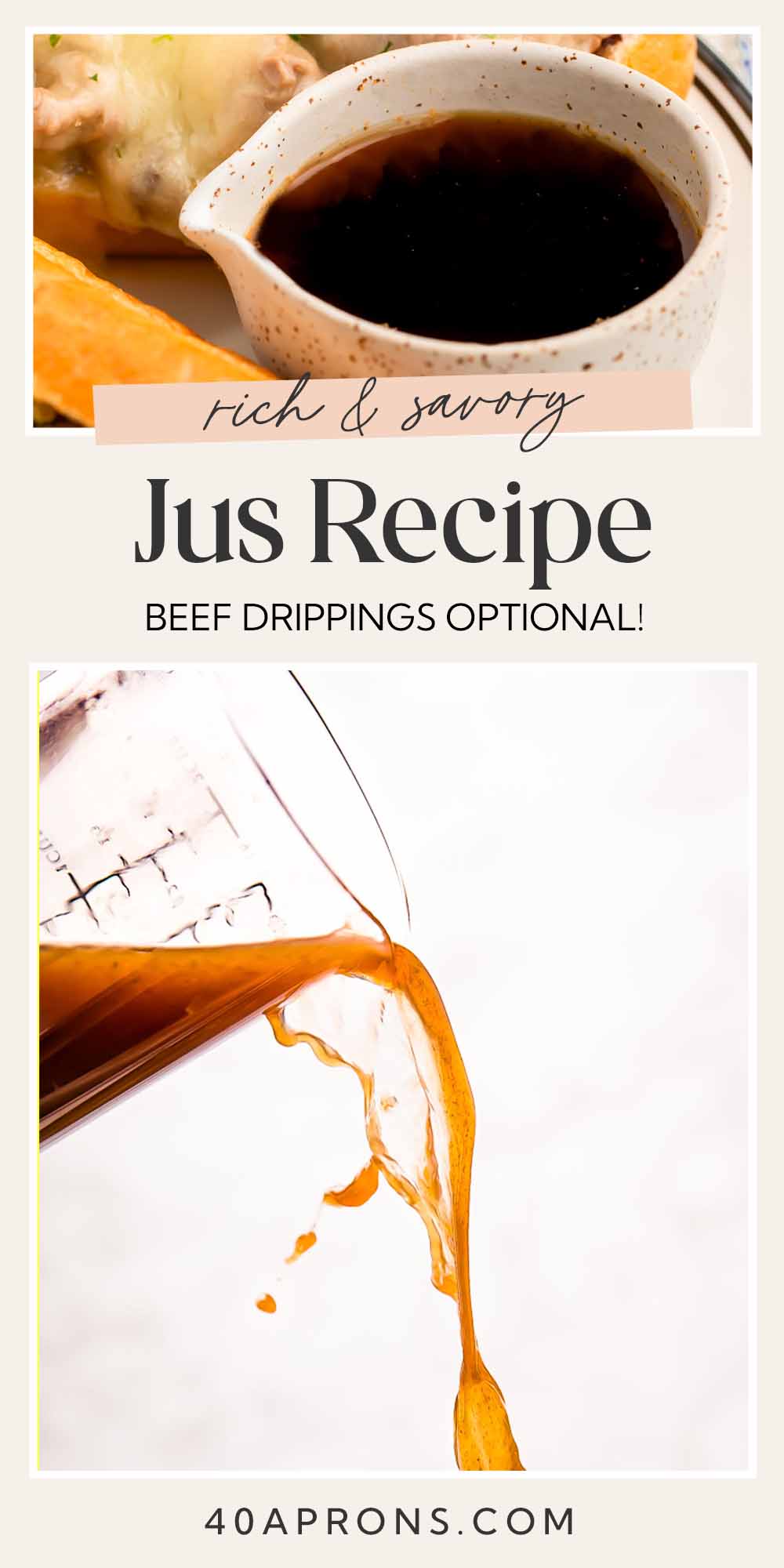
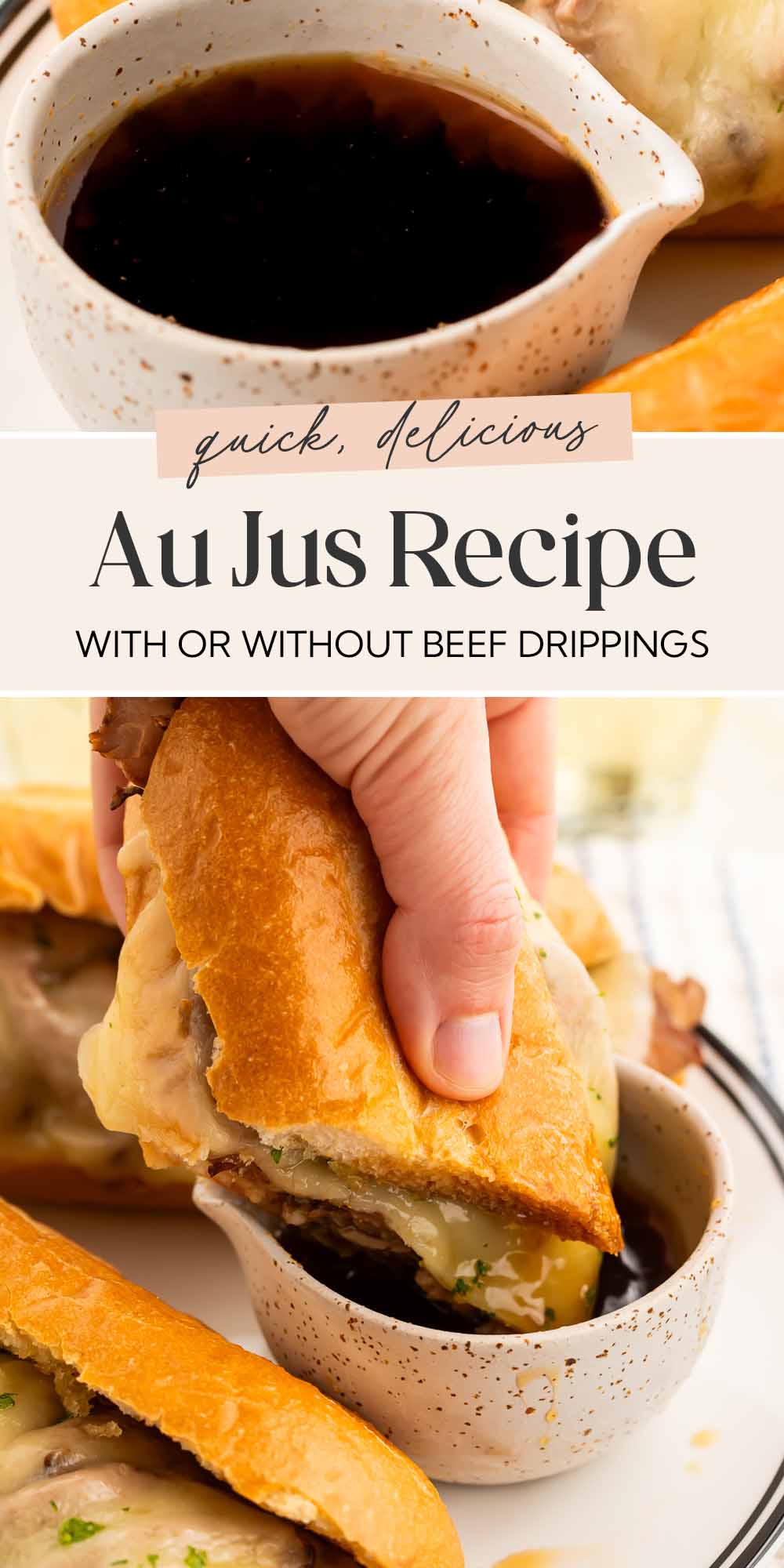
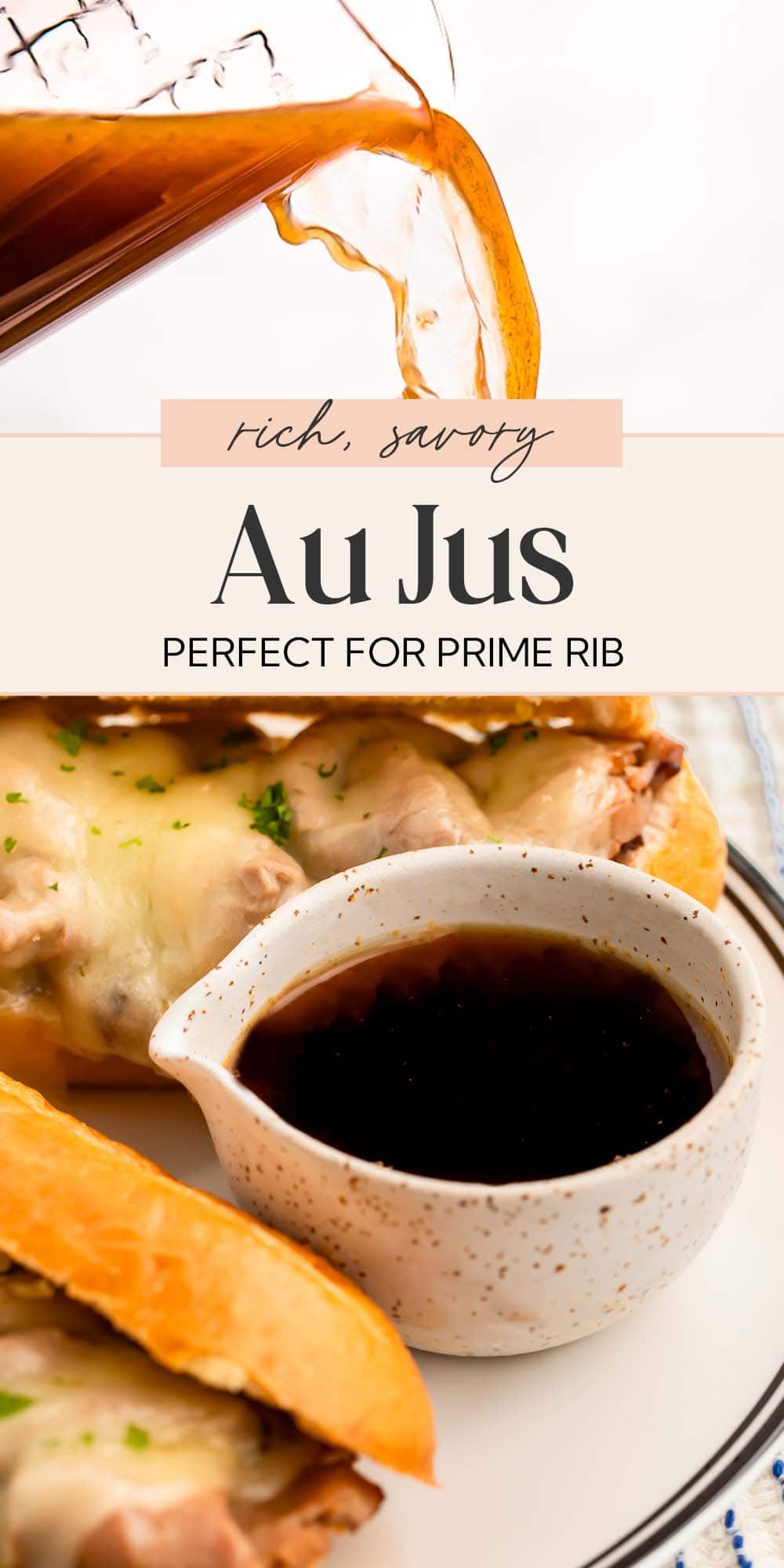
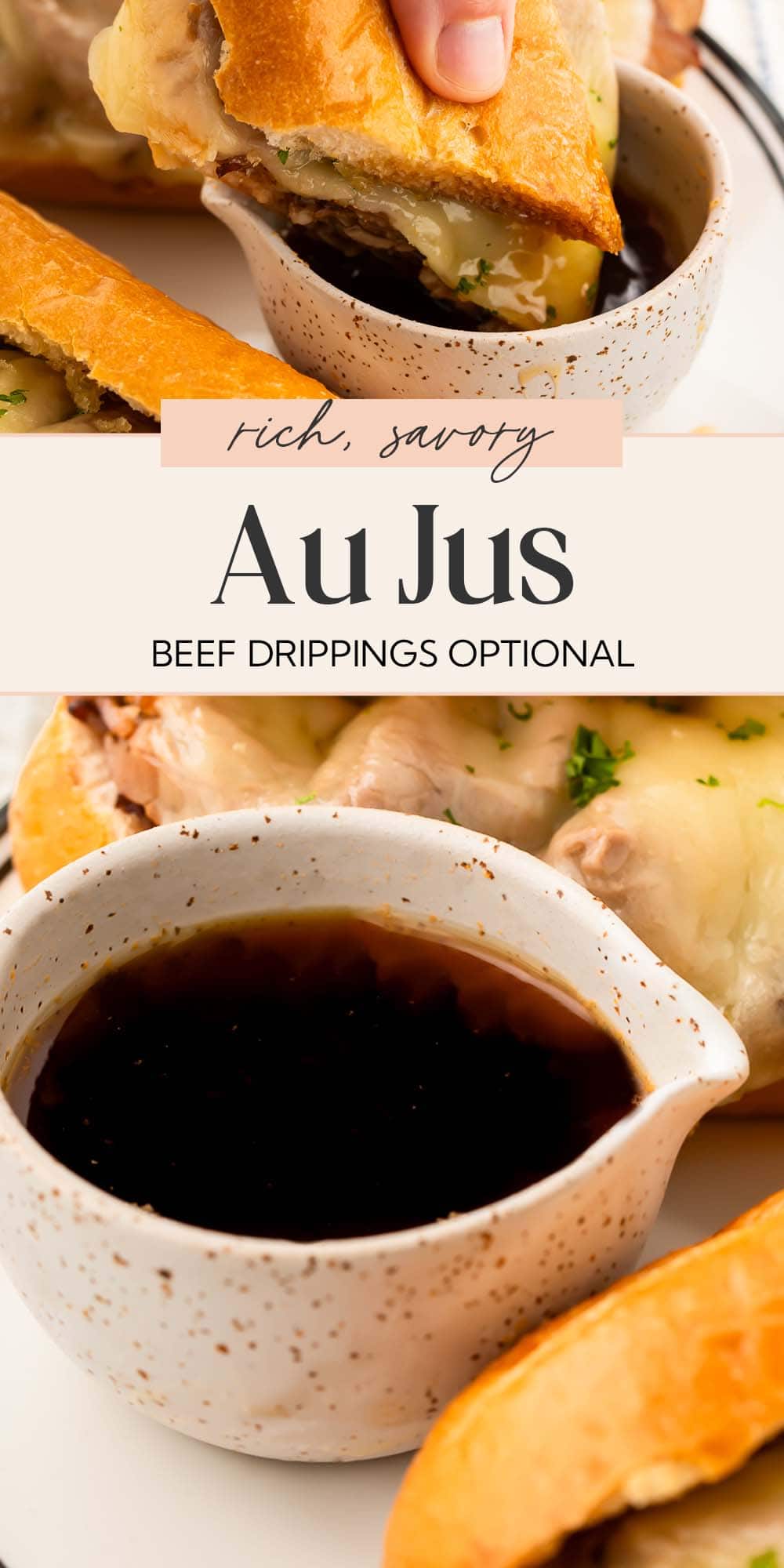



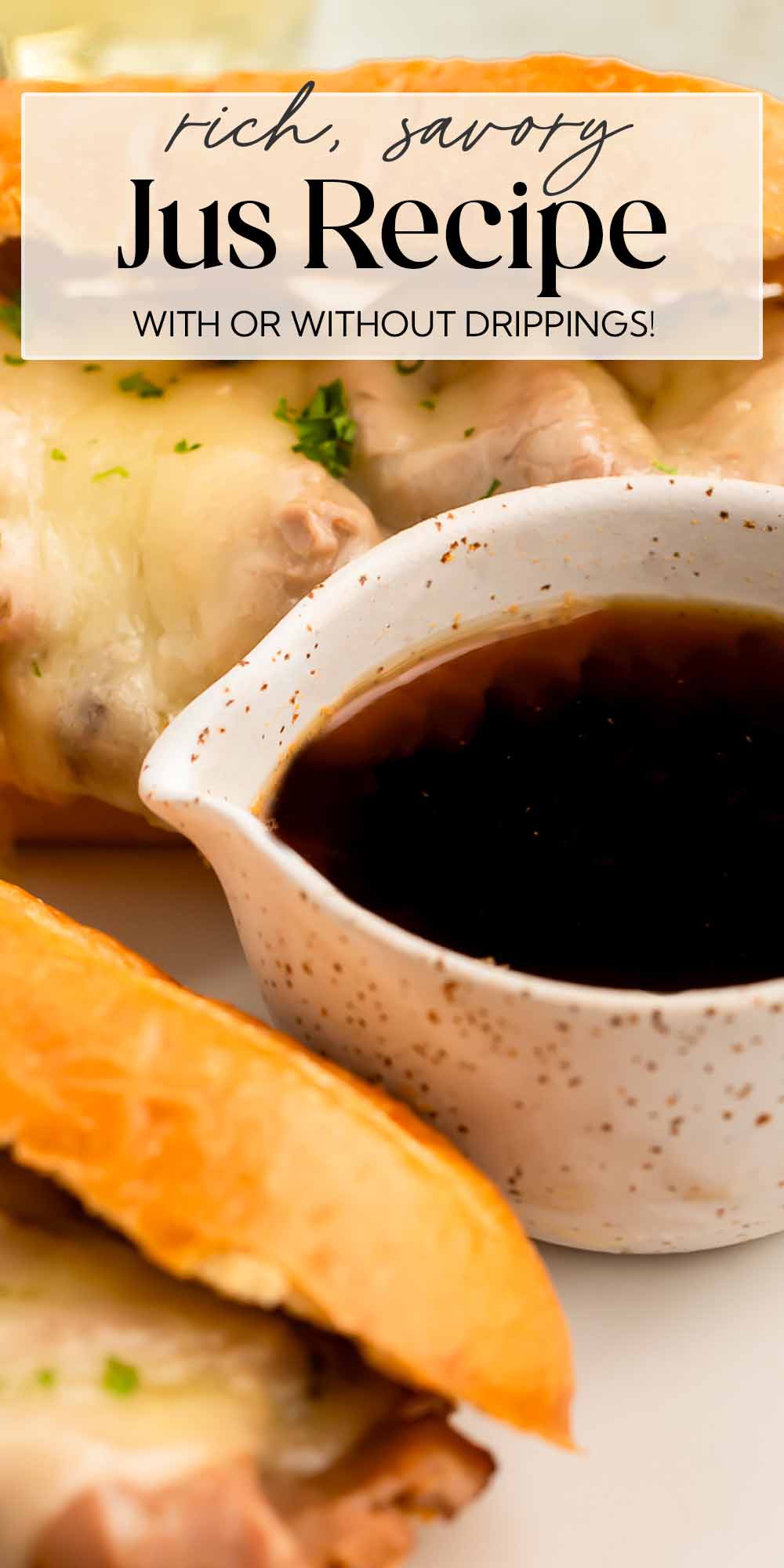
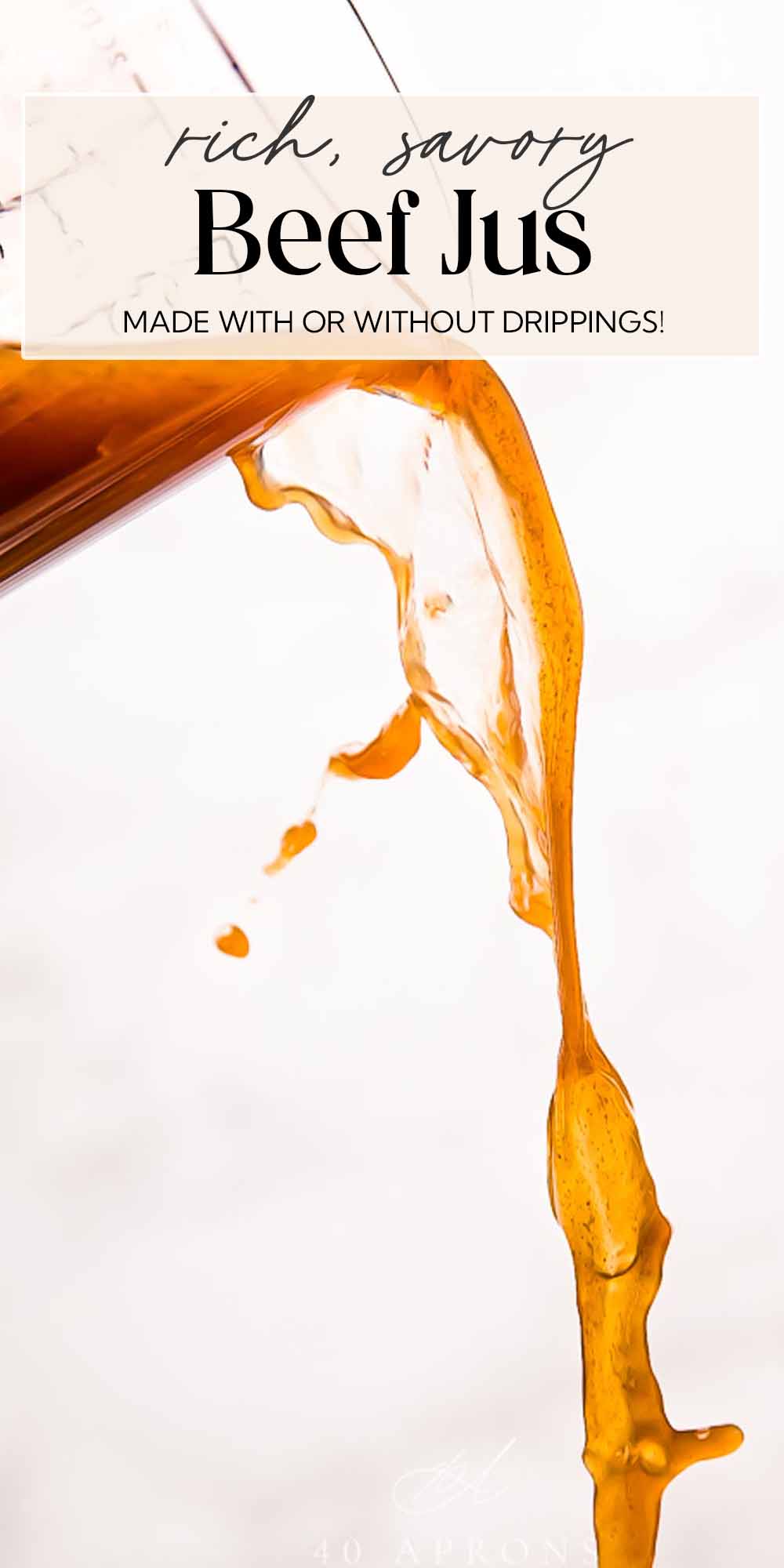
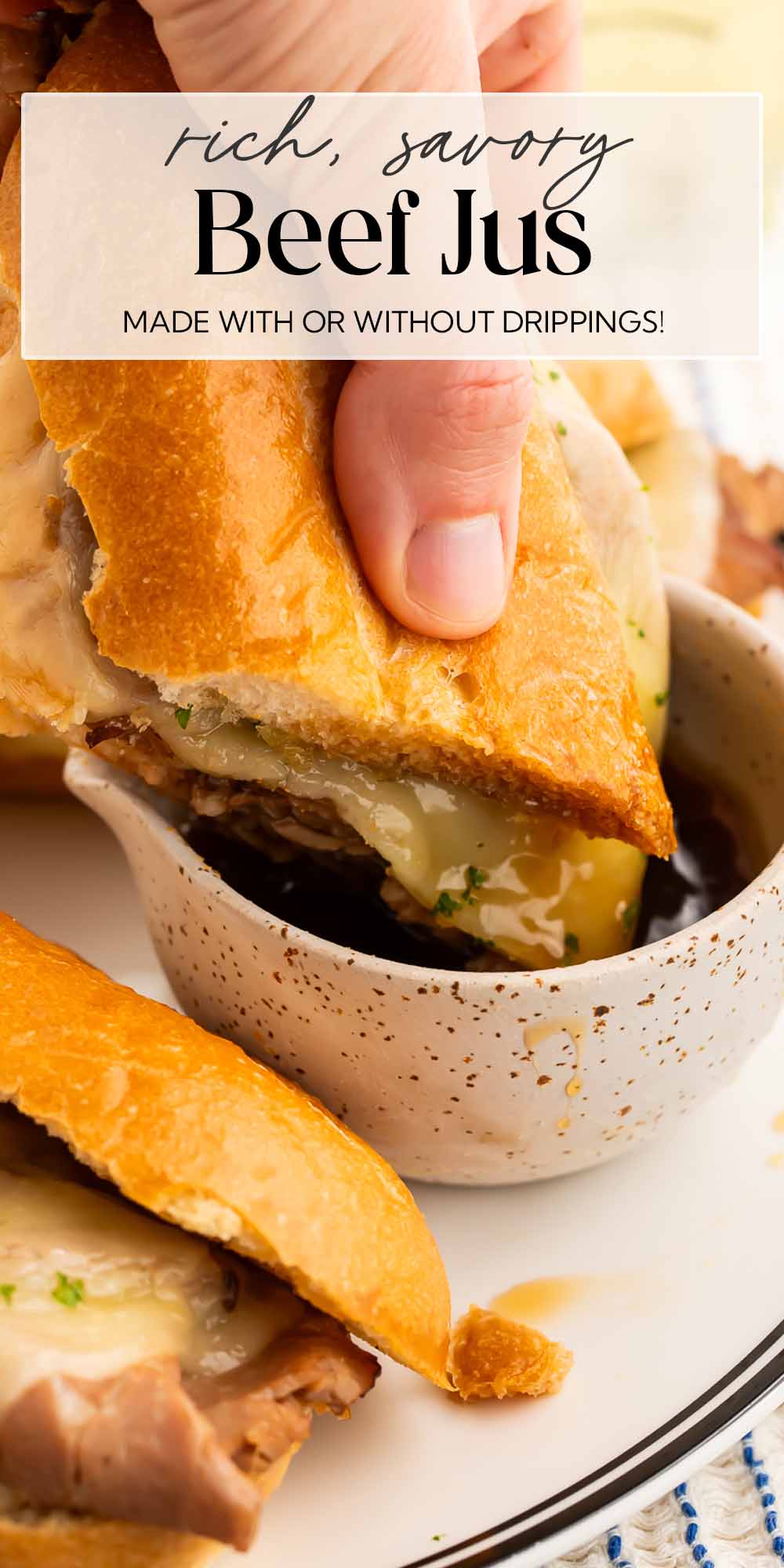
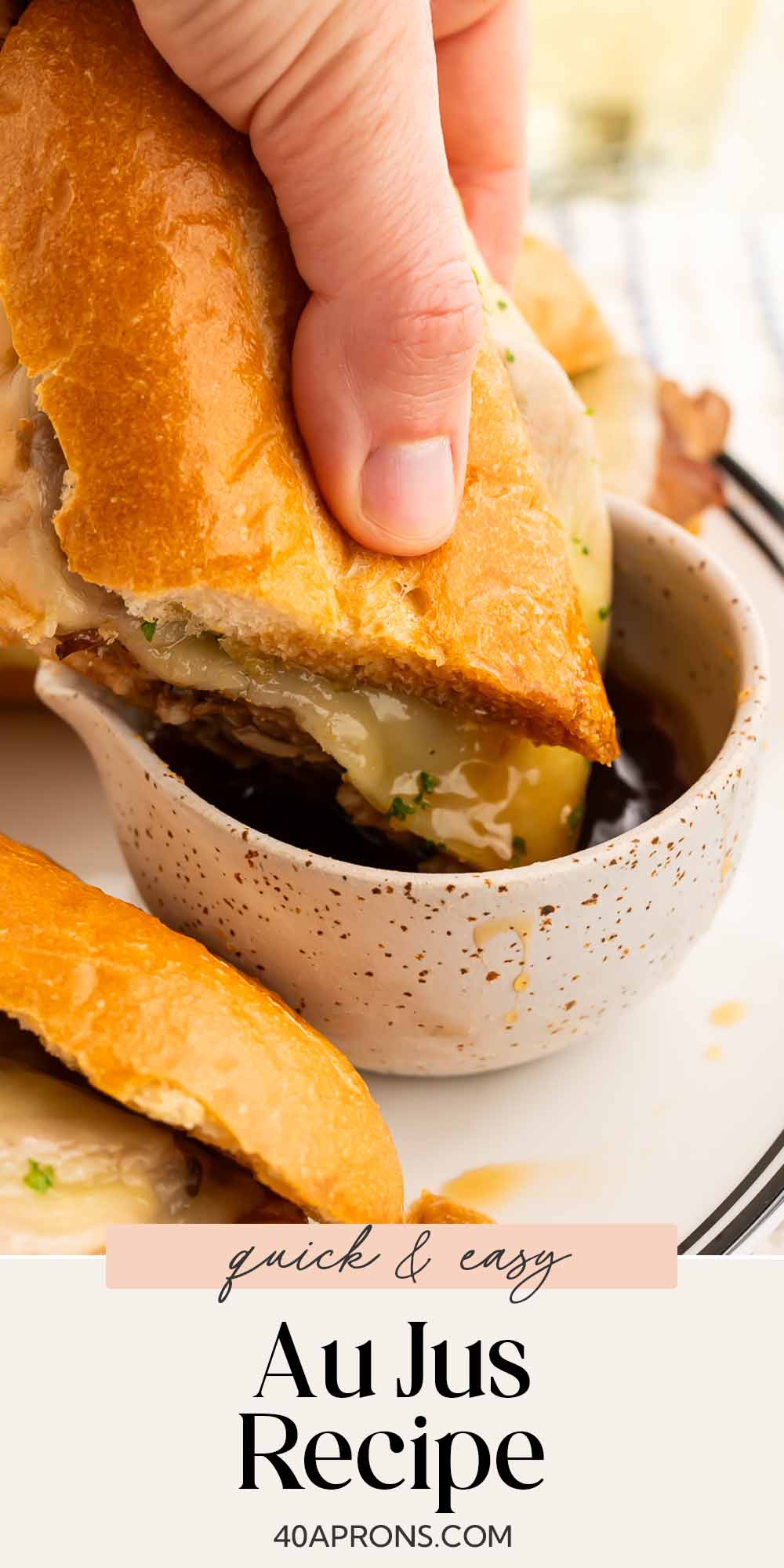
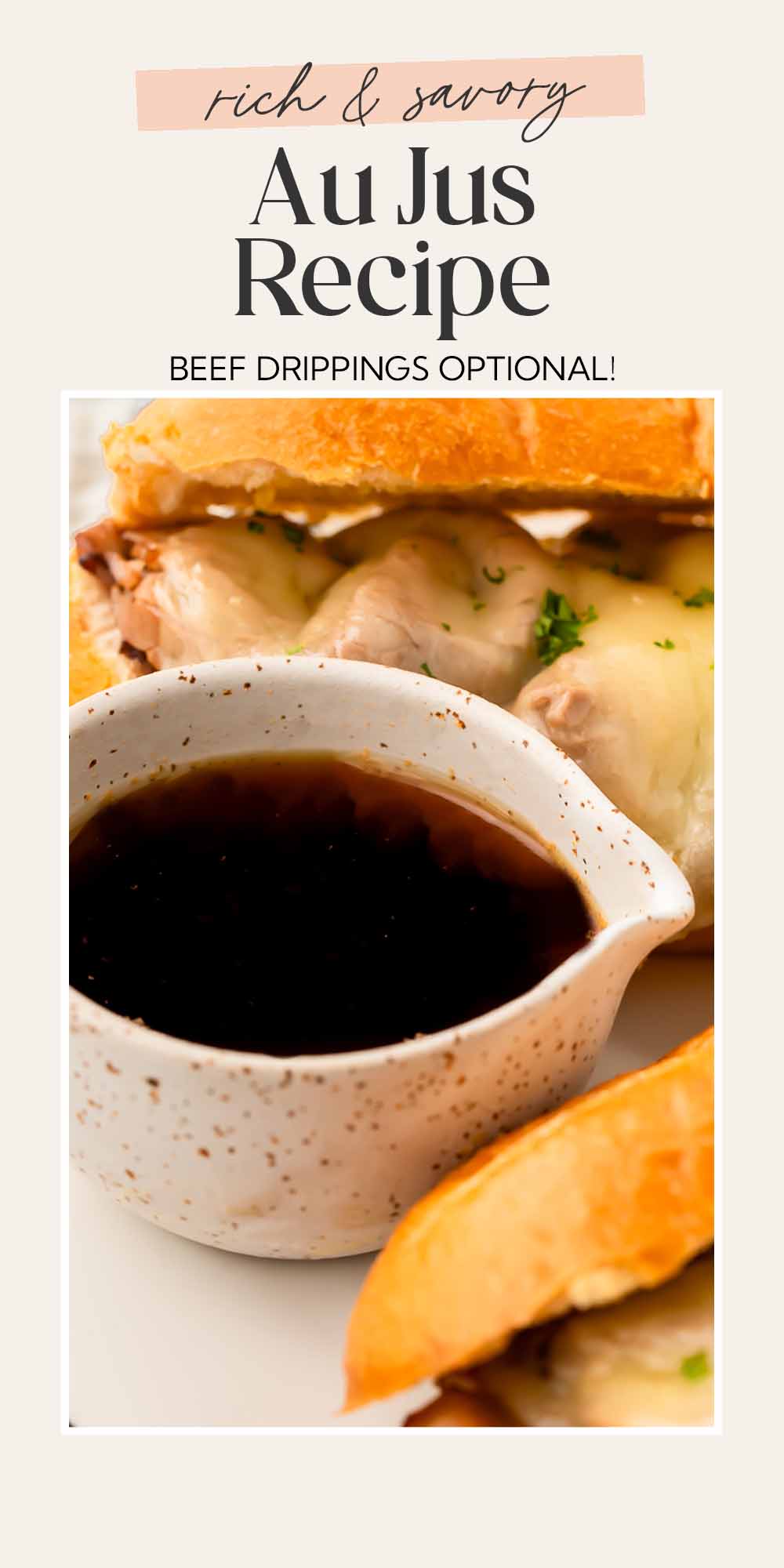
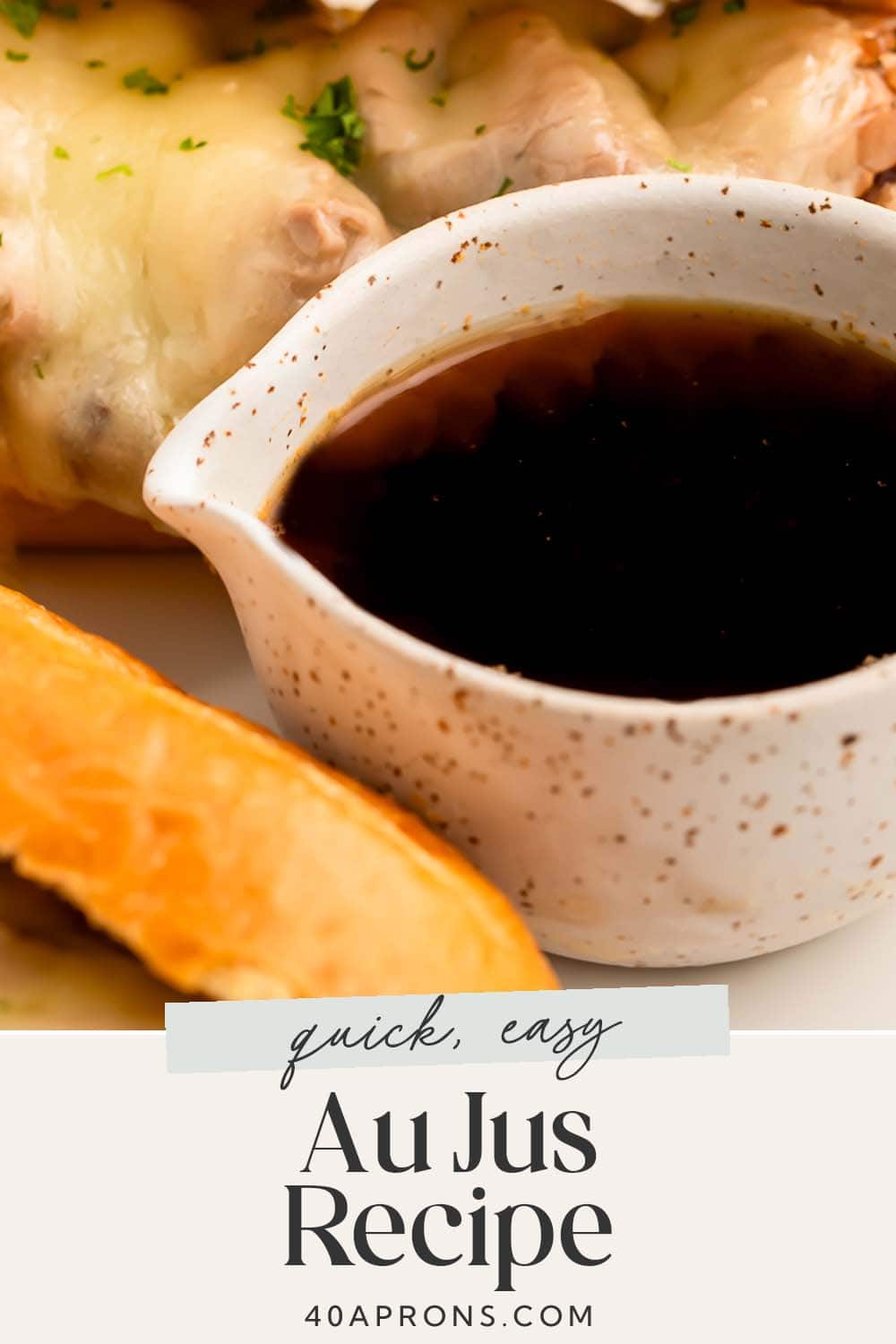
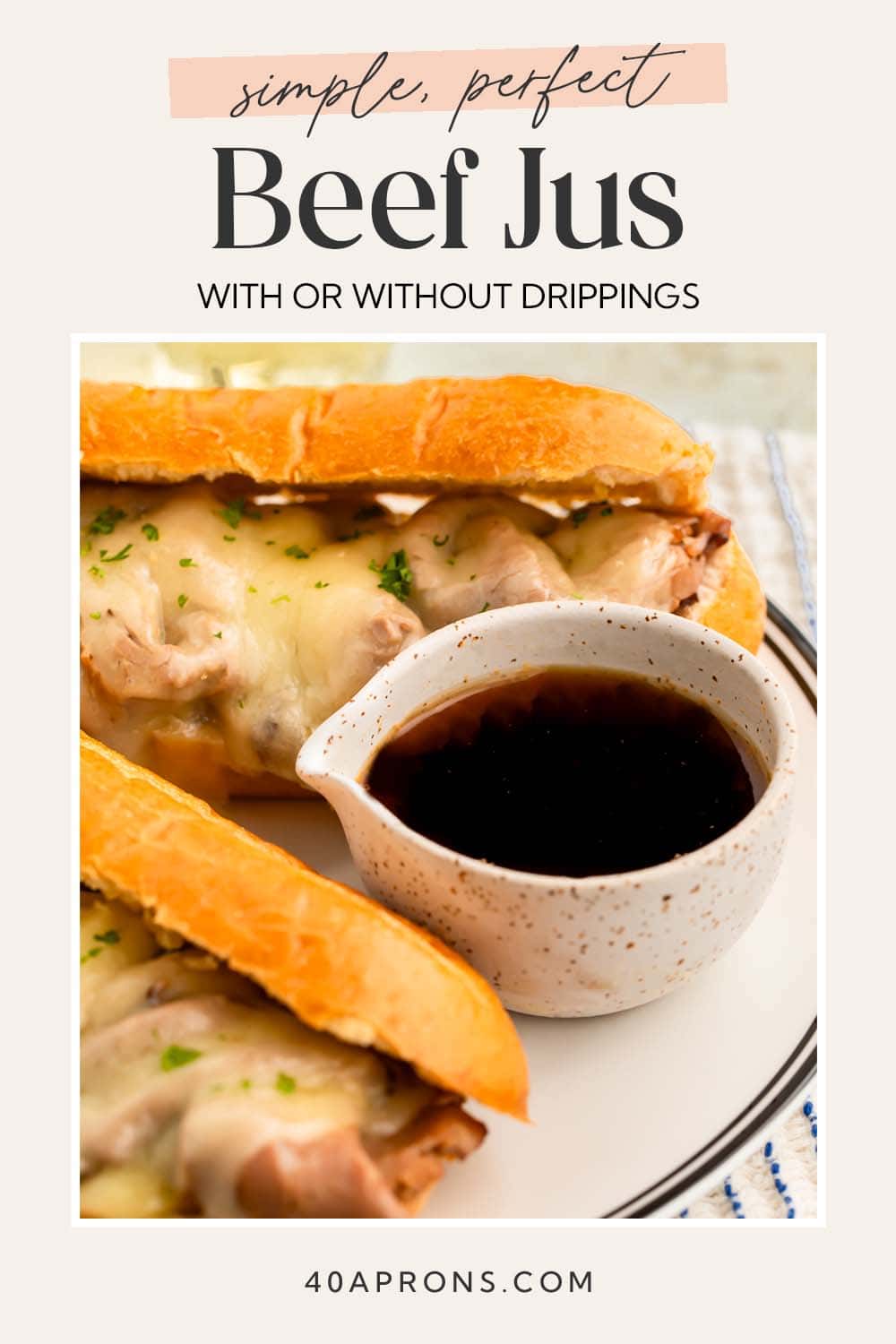
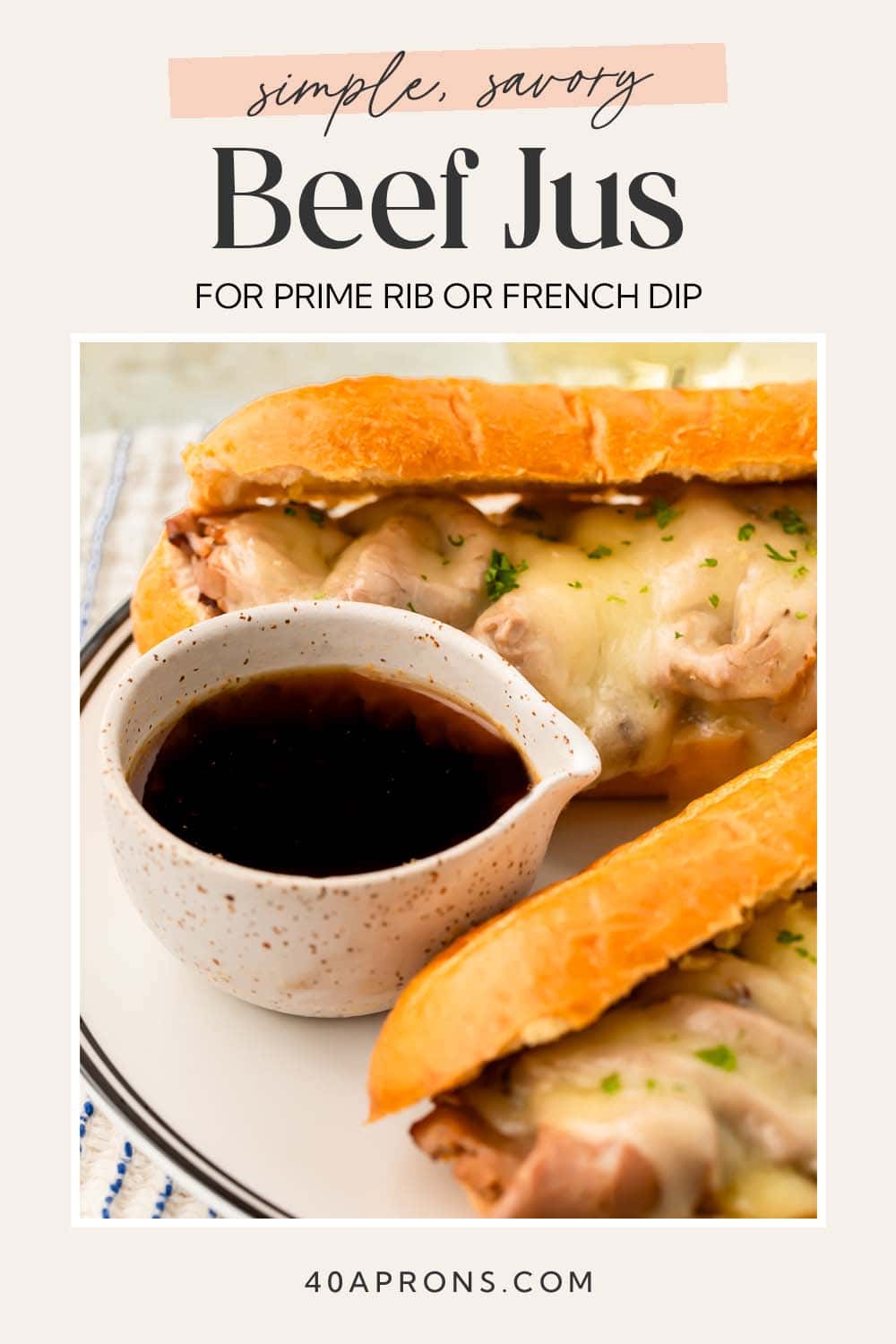
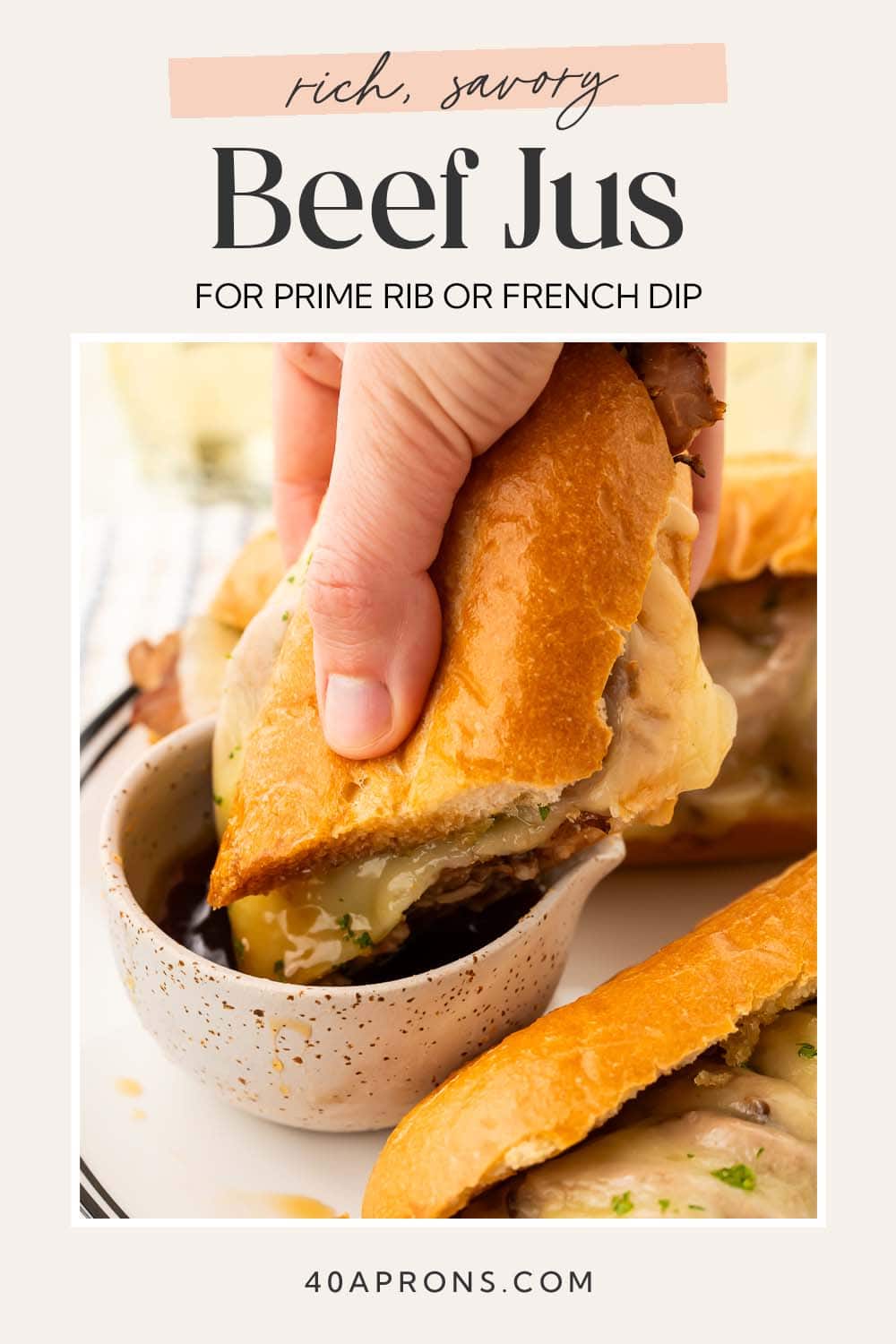
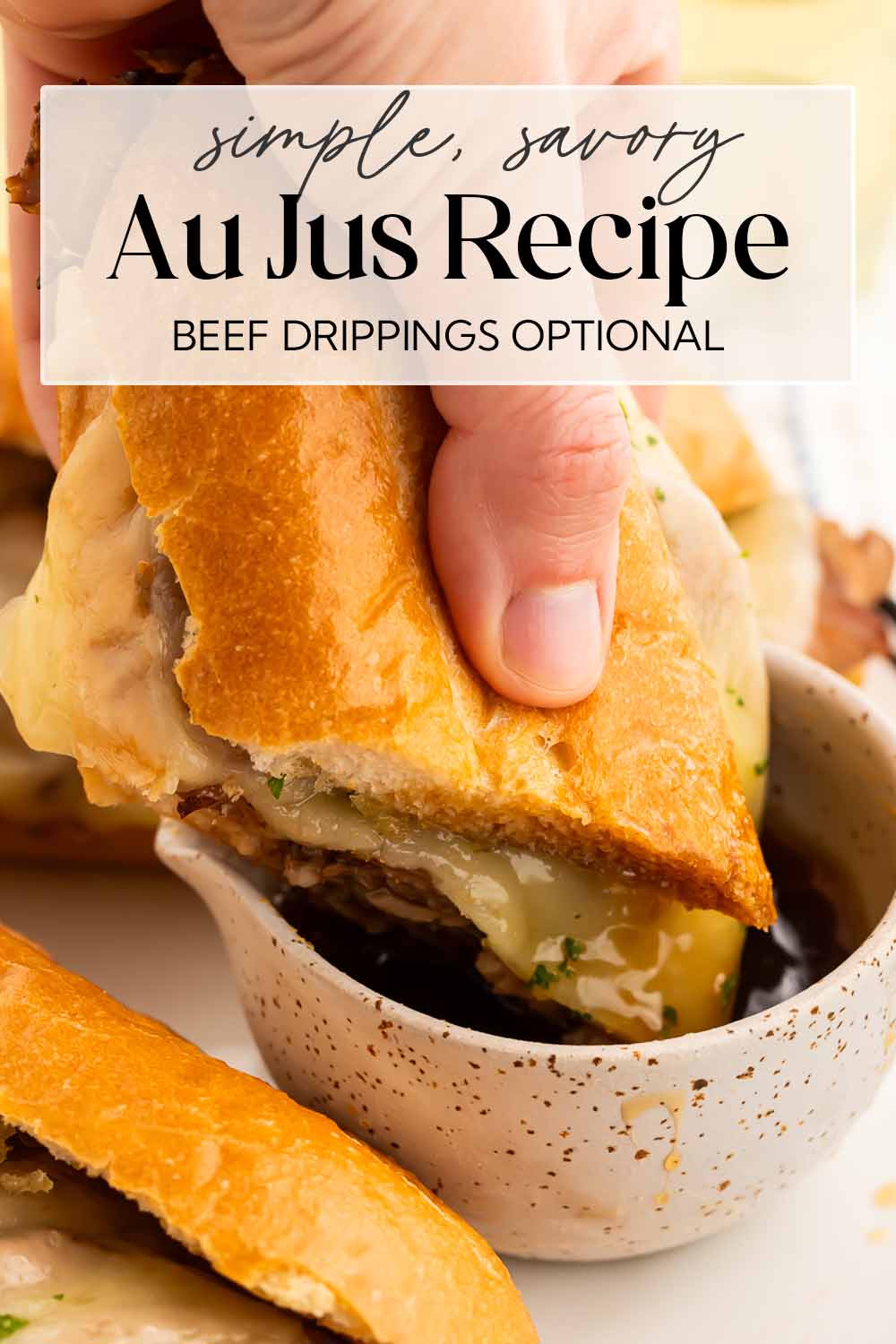
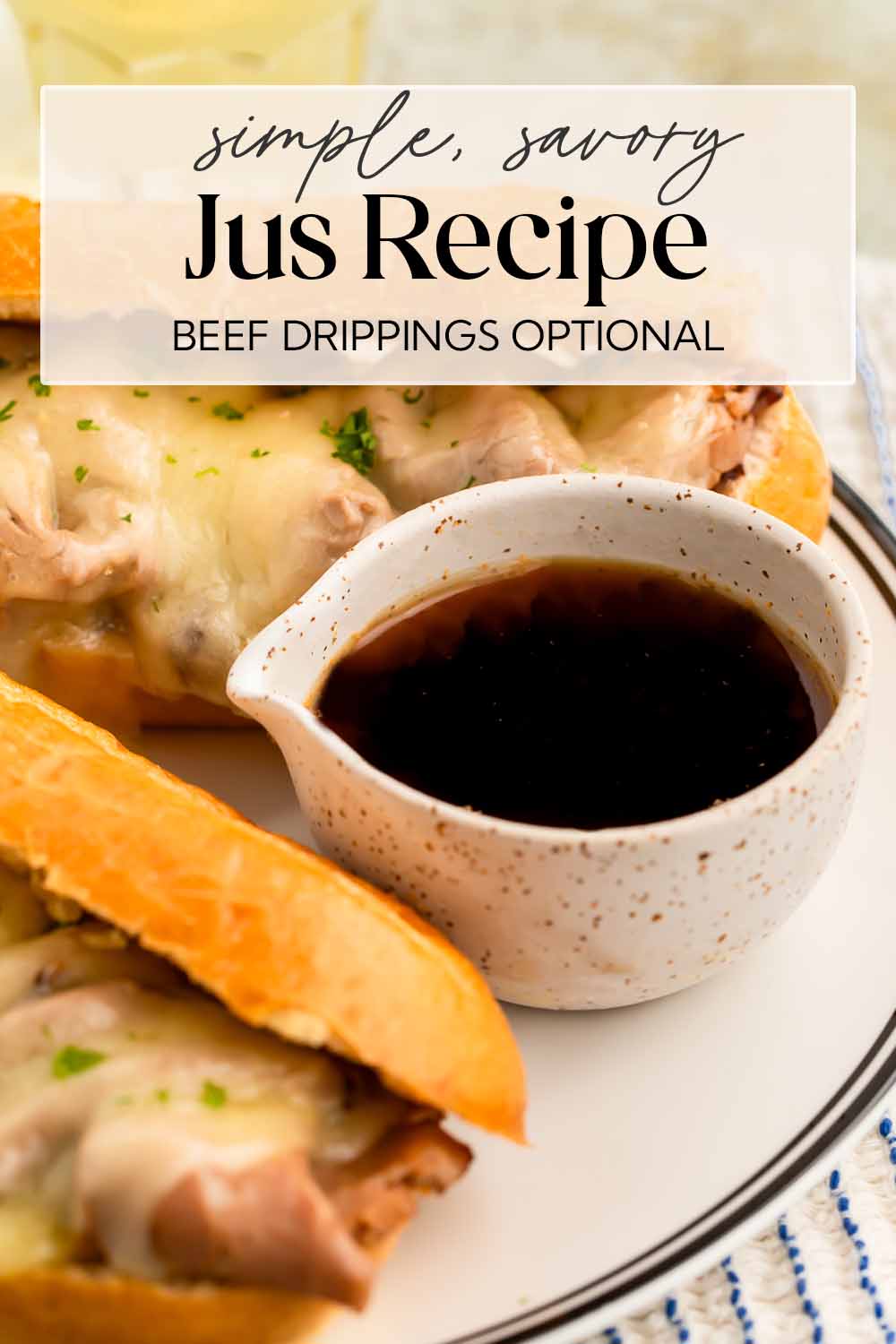
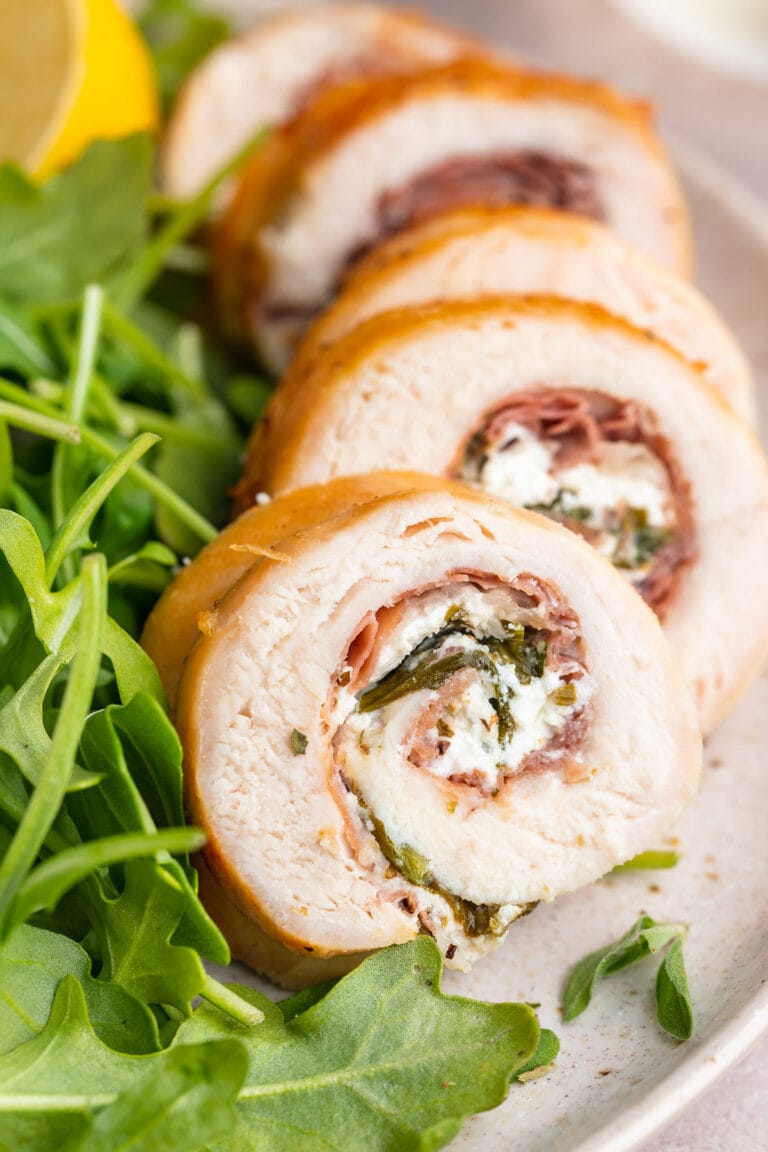
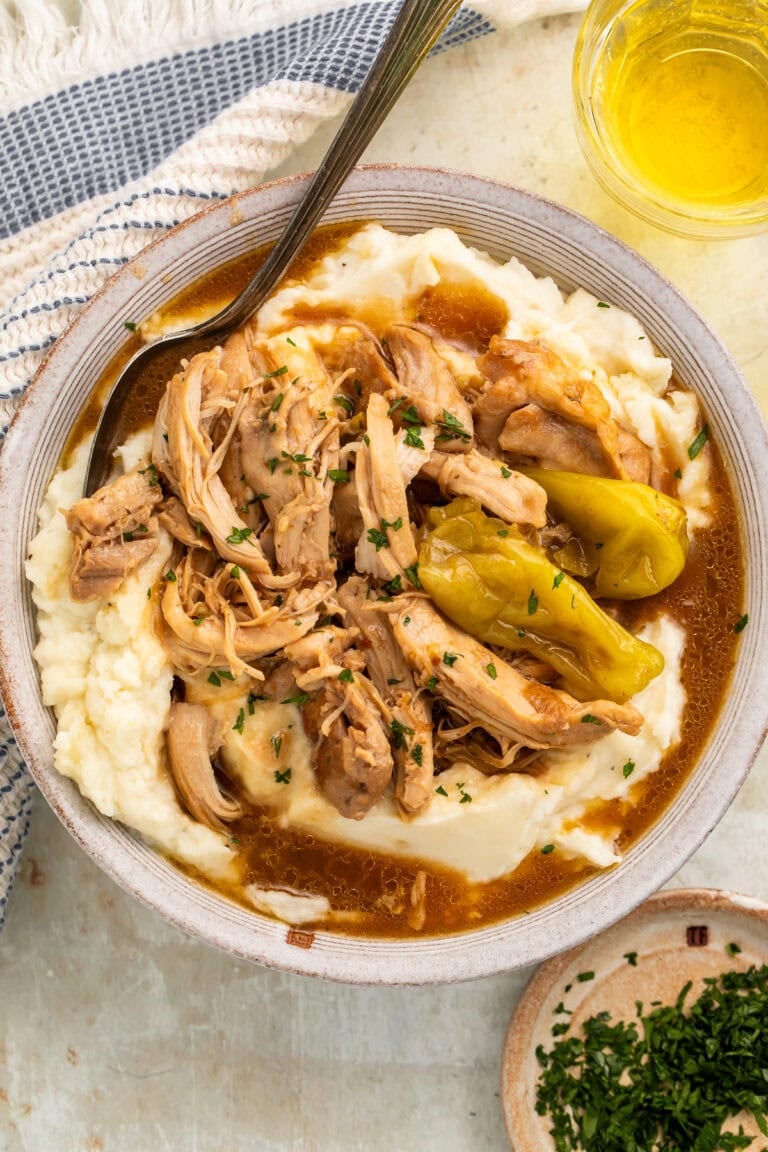
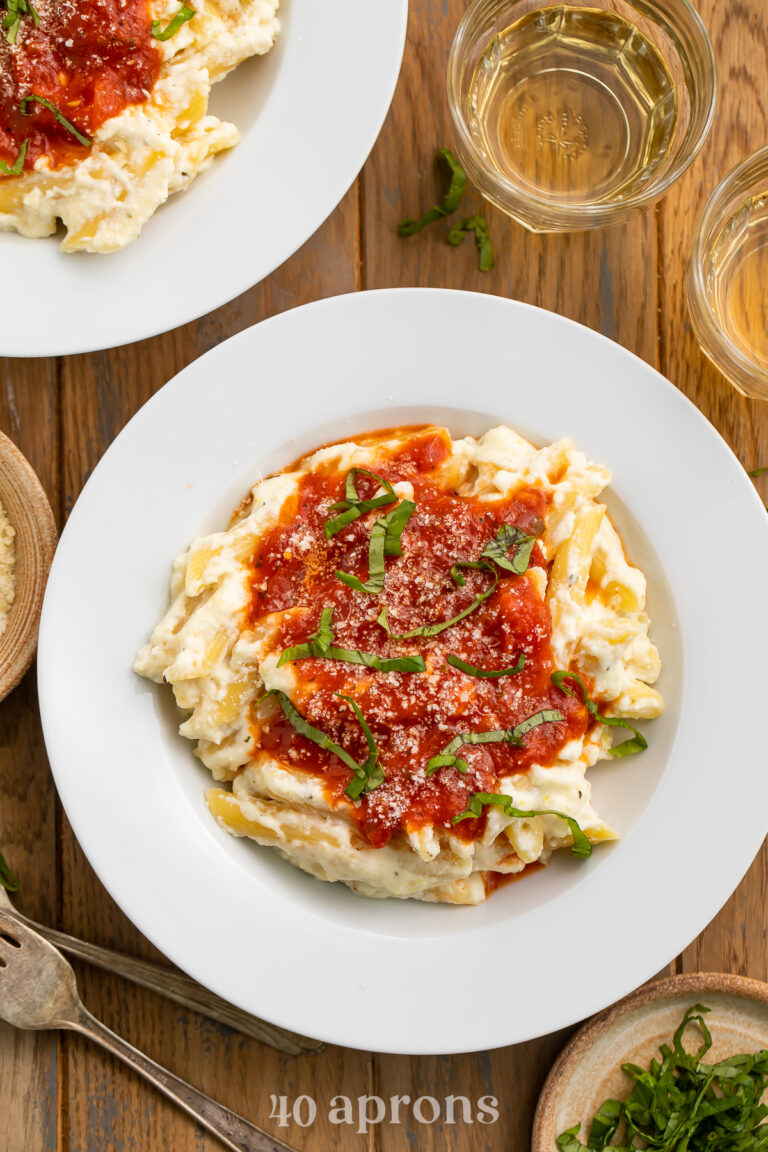
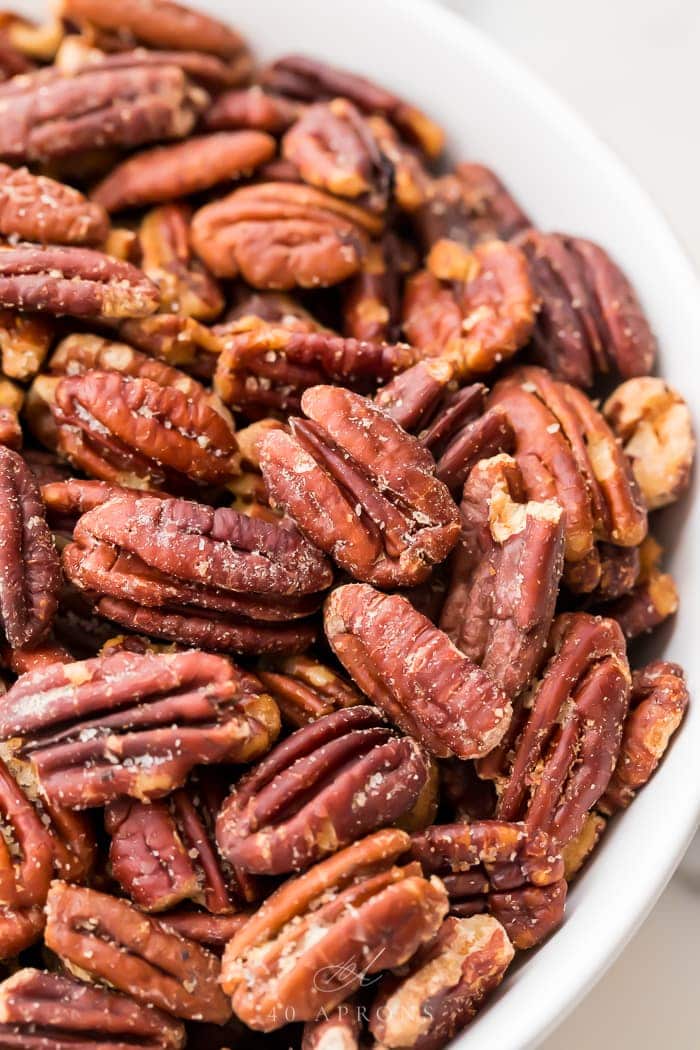

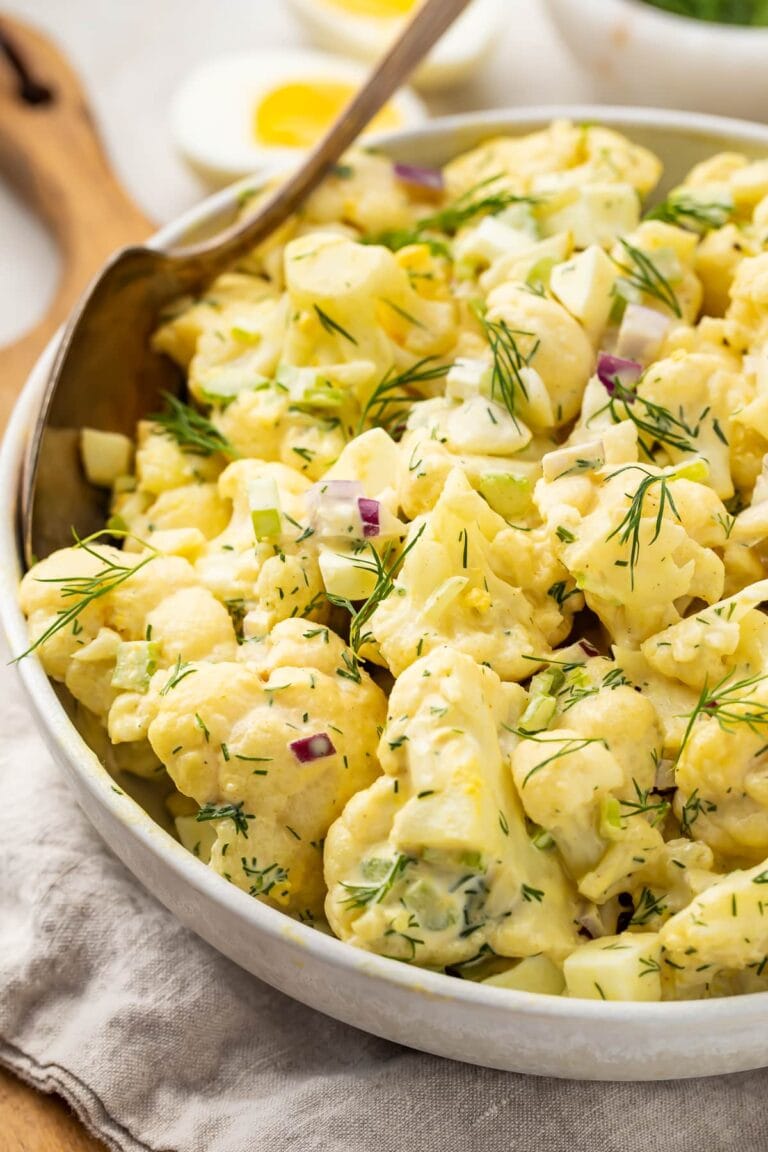










Hi,
I made this for Fathers day, I served Primed Rib and the Prime Rib was on the Grill So I did not have drippings. It was terrific. All guests commented on how tasty this Jus was. Thanks for the recipe…it’s a keeper.
Sondra
We’re so glad it was a hit! Thanks for sharing, Sondra!
Can you use ghee in place of butter?
We haven’t tried that substitution, but it should work! Be sure to let us know if you try it!
Fantastic. Used ‘Better than Bullion’ and a Cab Merlot wine. Added 1TBSP cornflour/water mix to thicken slightly. Perfect 👌
Ooh, yum! Thanks for sharing! 😊
Thanks,
I’ll use the w/o drippings version again.
We usually have prime rib medium rare with horseradish sauce, but had company that likes their meat medium to medium well, so thought I’d give this a try in case their portion came out too dry.
I added a shot of Better than Bouillon to make it extra beefy.
Yum! Thanks for sharing, JJ!
I saw the other posts once I had everything in the pot, so I let mine simmer a bit longer, just to give the wine some time to burn off…I doubled the recipe but followed it otherwise, and it turned out great to use for my beef sandwiches! We found it perfect for dipping and it was very tasty. I will be using this recipe again!
We’re so glad it was a hit! Thanks for sharing, Evonne!